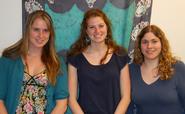
Whether we are aware of it or not, self-esteem governs much of what people do on an everyday basis. Self-esteem plays a large role in social interactions, expectations for the future, and one’s overall outlook. While the concept of self-esteem is certainly important in psychology, the term is difficult to quantify, isolate and study with precision.
One Hamilton research group, however, plans to tackle exactly this challenge. Over the summer, Arielle Berti ’13, Ellen Doernberg ’13 and Ashley Sutton ’13 will work with Associate Professor of Psychology Jennifer Borton on a study of self-esteem and how it affects everyday life.
Self-esteem can be subdivided into two categories: explicit and implicit. Explicit self-esteem is the way that an individual presents him or herself to the public. This translates to how outsiders view that person. Implicit self-esteem is the way in which one views oneself, which has to do with private thoughts unavailable to others.
Each type of self-esteem can be either “high” or low,” and the different combinations of high and low implicit and explicit self-esteem are what separate people into categories for the study. Those with high implicit and high explicit self-esteem are termed “secure” while those with low levels of both types are simply termed “low.” Those with high implicit and low explicit self-esteem are called “damaged” while those with low implicit and high explicit self-esteem are referred to as “defensive.”
The defensive category is what Berti, Doernberg, Sutton and Borton are most interested in. They hope to explore the interaction of social life and self-esteem among this category. They will be looking at risk-taking, attentional reactions and behavioral consequences.
In her free time, Berti, a psychology major with a math minor, works as a Psychology Statistics TA and math grader, enjoys playing the cello and will participate in America Reads this fall. Doernberg, a psychology major with a French minor, plays the flute, is part of Face Aids at Hamilton, enjoys reading and music, and works in the Admissions Office. Sutton, a neuroscience major, is an Emergency Medical Technician and works in the Athletic Trainer’s office. All three students look forward to running the tests themselves and they view the testing process as not only interesting, but enjoyable. While Doernberg enjoys watching the pieces of a study fall together toward the end, Sutton looks forward to learning new techniques with regard to testing physiological responses.
Self-esteem is certainly a relative concept, and it manifests itself in a variety of ways. However, self-esteem also plays a significant role in how people view themselves, others, and the world around them. Berti, Doernberg and Sutton’s group will work extensively with Professor Borton to find links between self-esteem and varying factors of social life, and they may just discover something about human nature in the process.
Ariel Berti is a graduate of Tantasqua Regional High School (Mass.), Ellen Doernberg is a graduate of Glen Ridge High School (N.J.), and Ashley Sutton is a graduate of Moravian Academy in Bethlehem, Pa.
Posted May 31, 2011
